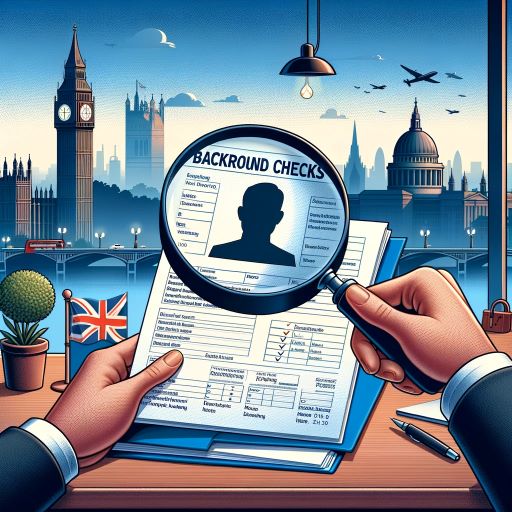

in sensitive positions are thoroughly vetted, organizations can assure the public that they are taking all necessary steps to safeguard sensitive information and critical infrastructure.
Baseline Personnel Security Standard (BPSS) checks and BS7858:2019 checks are both integral to pre-employment vetting in the UK, but they serve different purposes and are structured to meet the needs of different sectors. Pre-employment vetting BPSS is the standard background check required primarily for government employees and contractors to ensure they meet certain standards of trustworthiness and reliability. In contrast, BS7858:2019 is a specific British Standard providing detailed guidelines for the screening of individuals working in secure environments, often within the private sector, such as security and alarm system services.
By verifying nationality, immigration status, employment history, and criminal records, organizations can assess the suitability of candidates for positions requiring access to sensitive information like the Public Services Network (PSN).
Employers must also ensure transparency in the BPSS process. This involves informing candidates that a BPSS check will be conducted, what the check entails, and what specific information will be gathered. Candidates must also be made aware of their rights in the process, including the right to access the information collected about them and the right to appeal any decisions made on the basis of the BPSS check. This transparency helps maintain trust between the employer and the employee, and ensures that the process is viewed as legitimate and fair.
Employers in these sectors may request BPSS checks to ensure that their potential or current employees meet the necessary security standards to protect against risks such as espionage, terrorism, or sabotage.
Key components of BPSS clearance encompass verifying the right to work, conducting identity checks, checking criminal records, and confirming employment history. Ensuring the right to work involves validating an individual's legal status to be employed in the country. Identity checks are essential, requiring verification through official documents to confirm personal details.
- Complete and submit all required documentation accurately and truthfully.
- Report any changes in personal circumstances that may affect your clearance status promptly.
Transportation officials, especially those involved in overseeing or managing public transport security, require BPSS clearance due to the potential risks associated with transportation infrastructure and mass transit systems.
In these sectors, verifying the eligibility and trustworthiness of individuals handling government-related tasks is essential. By mandating BPSS checks for these specific roles and sectors, organizations can maintain secure environments, prevent unauthorized access to data, and enhance trust in their recruitment processes.
When undergoing a BPSS check, you're subjected to a thorough screening process to confirm your trustworthiness and eligibility for accessing sensitive information. This screening, which is a baseline personnel security standard in the UK, includes checks like Basic DBS Check, ID Check, Right to Work check, and 3-Year Employment History Check.
What Is in a BPSS Check?


BPSS checks are governed by standards set by the UK government, specifically designed to comply with national security guidelines for personnel working in secure environments. The implementation of BPSS checks ensures that individuals have the right to work in the UK and do not have affiliations or histories that could pose a security risk.
Reviewing a candidate’s employment history is another vital component of the BPSS checks. This involves verifying previous employment details, gaps in employment, and reasons for leaving previous positions.
The legal underpinning of BPSS clearance in the UK, though not defined by a single piece of legislation, is supported by a variety of laws and regulations that govern national security, data protection, and employment. This legal framework ensures that BPSS checks are conducted in a manner that is secure, ethical, and compliant with the broader objectives of national security and public safety.
Navigating the BPSS process can pose challenges, particularly when verifying identity and employment history manually. Delays often occur during manual verification processes, impacting the overall clearance timeline.
Who Needs a BPSS Check, Confirming the need for a BPSS check involves identifying specific roles and sectors where clearance is mandatory to safeguard sensitive information and establish trustworthiness.
Can You Fail a Bpss? Yes, you can fail a BPSS check if there are discrepancies in your identity verification, right to work status, criminal records, or employment history. It's essential to provide accurate information and meet the trustworthiness standards to pass the screening process. Failing to do so can result in not meeting the required eligibility criteria for accessing sensitive information and working in secure environments. Be honest and consistent to avoid failing the BPSS check.

What Is the Difference Between Bpss and Dbs? When distinguishing between BPSS and DBS checks, it's vital to recognize that BPSS focuses on national security vetting, identity verification, and right to work status, while DBS solely examines an individual's criminal record.
In industries where security is paramount, BPSS clearance acts as a first line of defense against potential internal threats. By vetting employees thoroughly before employment, organizations can prevent the exploitation of sensitive positions and protect against security breaches.
Although the right to work is typically verified at the start of employment as part of BPSS checks, it may need to be reverified if an individual’s circumstances change, such as the expiration of a visa or changes in immigration status. Continuous monitoring ensures ongoing compliance with legal requirements and maintains the integrity of the workforce.
BPSS Clearance is required to ensure that individuals are properly vetted before employment in sensitive or secure areas.
BPSS Clearance does not expire but may need to be updated or reviewed depending on employer policy or if personal circumstances change.
In some cases, urgent requests may be fast-tracked by the employer with proper justification.